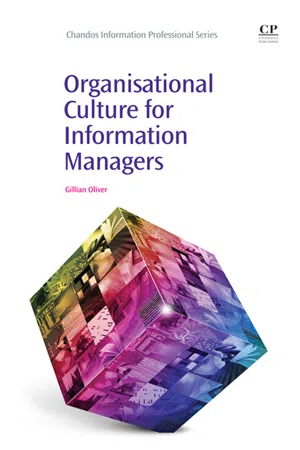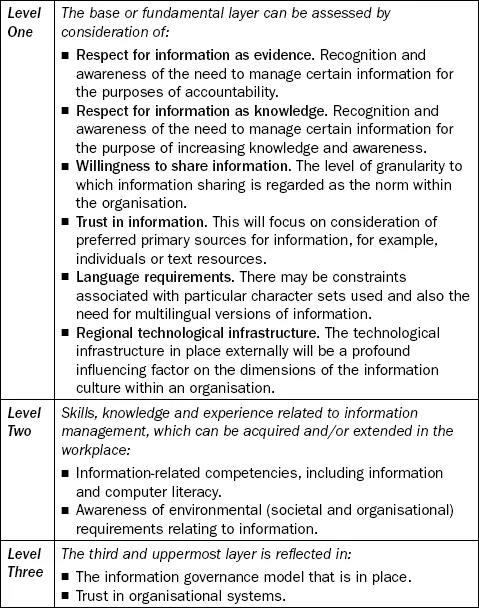
eBook - ePub
Organisational Culture for Information Managers
Gillian Oliver
This is a test
- 192 pagine
- English
- ePUB (disponibile sull'app)
- Disponibile su iOS e Android
eBook - ePub
Organisational Culture for Information Managers
Gillian Oliver
Dettagli del libro
Anteprima del libro
Indice dei contenuti
Citazioni
Informazioni sul libro
In today's digital environment the workplace is characterised by individuals creating information perhaps independently of formal systems, or establishing new systems without knowledge of information management requirements. This book explains and explores the concept of organisational culture, specifically within the domain of information management. It draws on the author's wide-ranging practical experience in different workplaces and uses research findings from cross-cultural studies of information management.
- Uses research findings from cross-cultural studies of information management
- Provides tools to develop practical and realistic solutions to real-world problems
- Draws on the author's wide-ranging practical experience in different workplaces.
Domande frequenti
Come faccio ad annullare l'abbonamento?
È semplicissimo: basta accedere alla sezione Account nelle Impostazioni e cliccare su "Annulla abbonamento". Dopo la cancellazione, l'abbonamento rimarrà attivo per il periodo rimanente già pagato. Per maggiori informazioni, clicca qui
È possibile scaricare libri? Se sì, come?
Al momento è possibile scaricare tramite l'app tutti i nostri libri ePub mobile-friendly. Anche la maggior parte dei nostri PDF è scaricabile e stiamo lavorando per rendere disponibile quanto prima il download di tutti gli altri file. Per maggiori informazioni, clicca qui
Che differenza c'è tra i piani?
Entrambi i piani ti danno accesso illimitato alla libreria e a tutte le funzionalità di Perlego. Le uniche differenze sono il prezzo e il periodo di abbonamento: con il piano annuale risparmierai circa il 30% rispetto a 12 rate con quello mensile.
Cos'è Perlego?
Perlego è un servizio di abbonamento a testi accademici, che ti permette di accedere a un'intera libreria online a un prezzo inferiore rispetto a quello che pagheresti per acquistare un singolo libro al mese. Con oltre 1 milione di testi suddivisi in più di 1.000 categorie, troverai sicuramente ciò che fa per te! Per maggiori informazioni, clicca qui.
Perlego supporta la sintesi vocale?
Cerca l'icona Sintesi vocale nel prossimo libro che leggerai per verificare se è possibile riprodurre l'audio. Questo strumento permette di leggere il testo a voce alta, evidenziandolo man mano che la lettura procede. Puoi aumentare o diminuire la velocità della sintesi vocale, oppure sospendere la riproduzione. Per maggiori informazioni, clicca qui.
Organisational Culture for Information Managers è disponibile online in formato PDF/ePub?
Sì, puoi accedere a Organisational Culture for Information Managers di Gillian Oliver in formato PDF e/o ePub, così come ad altri libri molto apprezzati nelle sezioni relative a Business e Information Management. Scopri oltre 1 milione di libri disponibili nel nostro catalogo.
Informazioni
Argomento
BusinessCategoria
Information Management1
The significance of organisational culture
Abstract:
This chapter explains the concept of organisational culture and establishes why it is necessary for information managers to understand this. The values accorded to information and attitudes to it are indicative of the information culture of organisations; understanding organisational culture will enable the development of appropriate strategies and systems. Two contrasting views of organisational culture are discussed, one which assumes culture is solely internally based and the other which acknowledges the external environment in which the organisation is situated.
Key words
organisational culture
information culture
national culture
Introduction
This chapter begins by discussing why it is important to understand organisational culture. Then I start to establish what organisational culture encompasses. Although it is a term that most people are familiar with, and many use frequently when discussing their workplace, interpretation and understanding vary greatly. Two of the key perspectives are discussed, one of which has unfortunately been very prevalent and influential on management thinking, to the detriment of information management. The final section of this chapter outlines the multilevel approach to organisational culture that underpins the thinking in this book, acknowledging the existence of national, occupational and corporate cultural influences in shaping our working environments.
Why is understanding organisational culture so important?
Whether you are a librarian, records manager or archivist, the objective of your work is to manage information. The primary purpose for which you are attempting to manage information will vary according to your occupation. Records managers and archivists manage information as evidence, for accountability. Librarians manage information for knowledge and awareness, and also sometimes for entertainment. So far, so good. These distinct purposes provide a universality for the work undertaken by information managers and enable us to work collaboratively (regionally, nationally and globally) to explore and develop appropriate technologies, systems and processes. However, the specific organisational context that librarians, records managers and archivists are working within is a primary influence on the way that they go about achieving their work objectives. For example, the way in which you would go about ensuring your clients are mindful of their information management obligations in a very structured setting such as a law firm would be quite different to a more anarchic environment such as a university.
Most information managers fulfil key roles in providing the necessary infrastructure to enable the organisation that they serve to function efficiently and effectively. But the nature of that organisation will vary widely, according to a number of factors, in particular



These factors are intertwined, and are likely to influence each other, but all play a role in shaping the culture of the organisation. Each of these will be explored further in this book.
Understanding the importance of these factors will enable the diagnosis of an organisation’s information culture – that is, the values accorded to information, and attitudes towards it, specifically within organisational contexts. Every organisation, no matter how large or small, regardless of type and function, wherever in the world it is situated, has an information culture. Table 1.1 presents a framework for the assessment of information culture; the levels are explored in Chapter 6.
Table 1.1
Framework for information culture assessment

Information culture is inextricably intertwined with organisational culture, and it is only by understanding the organisation that progress can be made with information management initiatives.
Organisations are microcosms of their broader societal context. They may appear to be self-contained, but definitely do not exist in isolation from their broader context. Often consideration of organisational culture focuses solely on internal factors, primarily management and resourcing. The key aim of this book, however, is to highlight and untangle all those features that influence what happens at the library, records service or archives.
One of the features that characterise information management is the sheer diversity of settings in which it is implemented. For that reason, many practitioners remain in the same environment and it can be difficult to swap settings, largely because of the specialist skills and knowledge required. A law librarian, for instance, attempting to change focus to a hospital setting will often be regarded as making a career shift and may find entry into the new field problematic. Consequently, any consideration given to the more fine-grained or nuanced aspects of organisational culture is often overlooked. Where there is differentiation according to setting in literature and guidelines for practice, this is generally restricted to broad-brush domains such as medicine and law. Nevertheless, the work of information managers in, say, hospitals in various parts of the world, although focused on the same outcomes, may be quite different in terms of priorities accorded to different services and activities.
The ways in which information managers will be affected by organisational culture will vary according to the extent to which the main elements of their work (users and materials) are internal to the organisation, or external. For example:


Indice dei contenuti
- Cover image
- Title page
- Table of Contents
- Copyright
- List of tables
- About the author
- Introduction
- Chapter 1: The significance of organisational culture
- Chapter 2: National culture
- Chapter 3: The structural environment
- Chapter 4: Occupational culture
- Chapter 5: Corporate culture
- Chapter 6: Assessing information culture
- Chapter 7: Scenarios
- Conclusion
- Index
Stili delle citazioni per Organisational Culture for Information Managers
APA 6 Citation
Oliver, G. (2011). Organisational Culture for Information Managers ([edition unavailable]). Elsevier Science. Retrieved from https://www.perlego.com/book/1836809/organisational-culture-for-information-managers-pdf (Original work published 2011)
Chicago Citation
Oliver, Gillian. (2011) 2011. Organisational Culture for Information Managers. [Edition unavailable]. Elsevier Science. https://www.perlego.com/book/1836809/organisational-culture-for-information-managers-pdf.
Harvard Citation
Oliver, G. (2011) Organisational Culture for Information Managers. [edition unavailable]. Elsevier Science. Available at: https://www.perlego.com/book/1836809/organisational-culture-for-information-managers-pdf (Accessed: 15 October 2022).
MLA 7 Citation
Oliver, Gillian. Organisational Culture for Information Managers. [edition unavailable]. Elsevier Science, 2011. Web. 15 Oct. 2022.